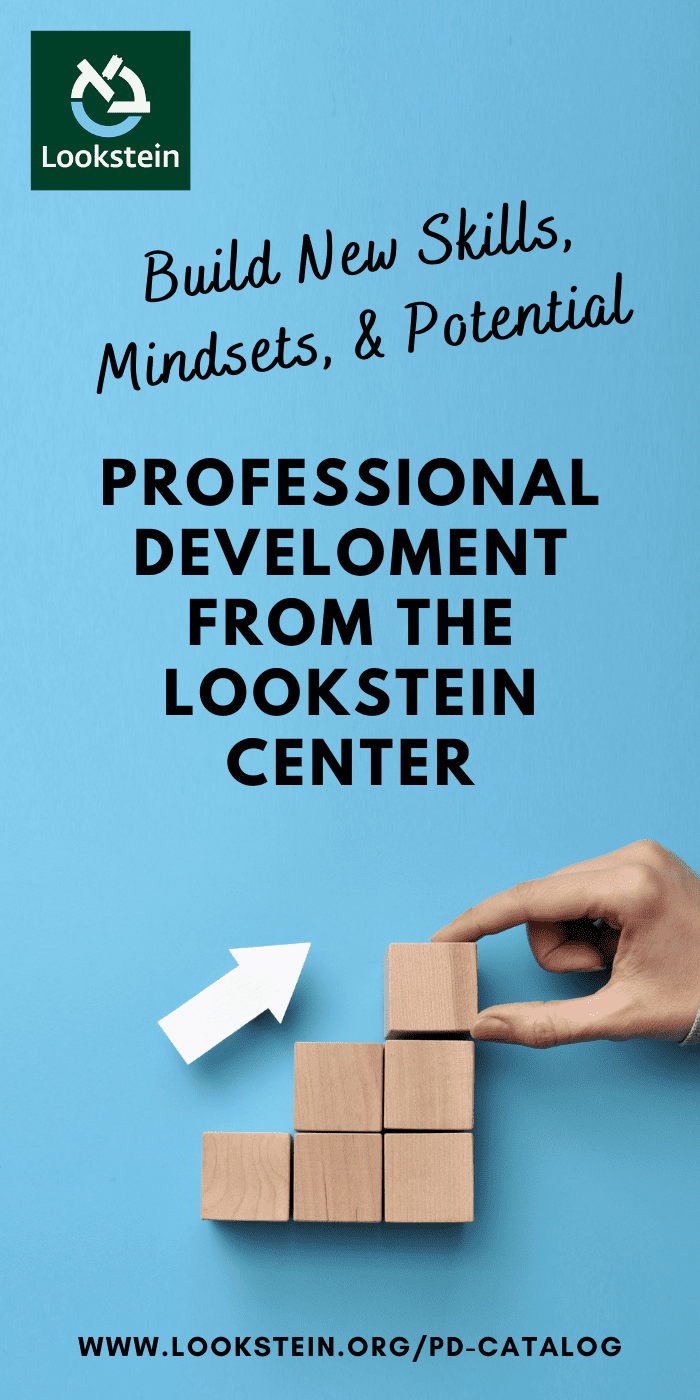I have the extraordinary privilege of being in private practice and teaching in Jerusalem where I work with young children and adolescents, parents and teachers, whole families and gap year students. It is from the gap year students that I am exposed to specific insights, experiences, and realities for North American Jewish adolescents inching their way toward adulthood in the early 21st century. Theirs are stories of privilege and access, of opportunity and exposure, of close families that can also be complicated, about friendships that are confusing, and about identity formation in a time of technology and rapid change. In other words, they are the typical concerns of an emerging adult in 2020. What is unusual, though, is the struggle these young people face as they manage their day-to-day lives — the inability to take charge of their own decisions, to deal with disappointment, or to navigate complexity. Seemingly slight disappointments manifest as enormous setbacks in their minds. Many are crippled by anxiety and overwhelmed by even the most mundane day-to-day activities and experiences. They lack the confidence to make decisions and take charge of their realities.
Of course these emerging adults do not deplane in Tel Aviv in September and become nervous, anxious and dependent. They board the flight shlepping around the baggage of a childhood in which they were embraced, supported and supervised to an extreme, but given so few of the tools they need to thrive on their own. Very often they don’t realize how heavy that baggage is until they get to Israel and have to carry it themselves for the first time. I (and many others) believe that the contents of that baggage are the results of themes and norms that animated their childhood and that show up in the reality of a daily existence in which young adults have been given tremendous academic and other opportunities, but have not been given the opportunity to exercise the muscle of resilience.
The good news is that it’s not too late.
In observing the conspicuous lack of independence and resilience in our children and students, we naturally ask the question, “can resilience be taught?” While it isn’t simple, there is plenty of research to back up the idea that resilience is something that can be carefully cultivated in young people, and that with proper interventions we can see radically different adolescent outcomes.
Encouraging Mistakes
Internationally renowned educator Sir Ken Robinson, whose 2006 TED Talk is the number one TED Talk in history with more than 63 million views and counting, argues that “we’re now running national education systems where mistakes are the worst thing you can make. [But] if you’re not prepared to be wrong, you’ll never come up with anything original. By the time they get to be adults, most kids have lost that capacity. They have become frightened of being wrong.” Robinson urges us to reconsider the paradigms within our classrooms, within our grading systems, within our feedback and assessment mechanisms, indeed within our comprehensive school cultures.
Colleagues Adina Glickman (Stanford University) and Abigail Lipson (Harvard University) have collaborated on launching several initiatives aimed at strengthening college students who experience crippling fear, nervousness and disappointment when faced with failure or setback. They termed these students “failure deprived.” The problem these students face is the product of a lifelong avoidance of significant failure. High academic achievement, successful navigation of social complexities and a childhood of great privilege infuse an individual’s life with accomplishment but are also typically in tandem with significant parental (over)involvement and systems that accommodate rather than challenge. This often manifests in breakdowns and “freak outs” when faced with inevitable failure and disappointment in late adolescence. To avoid this phenomenon, students ought to be allowed to fail without parental or teacher intervention so that they can experience the thought processes and skill development that arrive in the moments of “what do I do next?” The challenge is to use the creative energies of faculty members to envision a pedagogic framework in which “mistake” or “failure” is not an unavoidable, unfortunate by-product of learning, but rather an essential and integral ingredient of the learning process itself.
Stay Out Of It
Almost exclusively coming from a place of love and support, we (as parents and teachers) have a tendency to insert ourselves into our children’s experiences, logistics and relationships, and to rob them of the opportunity to learn how to manage time, conflict and the complexities of growing up.
Distinguished psychologist Alfred Bandura famously advanced a theory of self-efficacy in which he argued that a belief in one’s abilities – not in the abilities of parents, teachers or associates – empowers an individual to complete tasks, attain goals and manage complex situations. Self efficacy is built and nurtured by the trial-and-error rhythm of appropriately messy childhood and adolescence, by the cadence of consistent commitment to problem solving. It is a belief in one’s own abilities on a very realistic level – neither overblown nor undervalued. Julie Lythcott-Haimes, former Stanford Dean of Students (and author of best-selling book, How To Raise An Adult) explains the adult struggle with allowing children to struggle by saying that, “we can’t buy resilience for them in the way we buy tutoring, coaching, test prep, and college counseling. Resilience is built from real hardship and cannot be bought or manufactured.” A critical ingredient to the formulation of self efficacy is that it can only be achieved by “doing the work” and witnessing the success that results from one’s own effort, critical thinking and skill mastery.
Imagine how the dynamic of the school-student relationship changes when the student is treated as the Chief Decision Maker regarding his commitment to academics, his understanding of the impact of his behavior, and his responsibilities to manage his own time. The typical conversation about a particular student struggle is a conversation between teacher and parent. How might the conversation, and ultimately the outcomes of that conversation, be shifted if the student is at the center of the discussion? Many children may be uncomfortable resolving an issue directly with the teacher, but it is the confrontation with discomfort itself that teaches a young person how to manage awkwardness and injustice and how to self-advocate. When a parent intervenes on the child’s behalf, the child loses an opportunity to learn those critical skills. Similarly, consider the degree to which parents and teachers coordinate play dates, suggest recess activities and manage social conflict. There are certainly elements of logistics and conflict resolution that require the input of an adult, but children are capable of managing far more than they typically do when given the chance to figure out how to do so.
Communal Responsibility
Israeli schools have come a long way from the kibbutz model of decades gone by, but remnants can be found in many corners of today’s Israeli education. One of those remnants is an expectation of communal responsibility. Of course Israeli schools employ janitorial staff, but it is very common for a specific class to be designated as responsible for stacking all of the chairs in the auditorium after a school assembly. Or for a student committee to inspect the cleanliness of the classrooms, and hold the classroom’s students accountable. Or for school-wide programs to be run almost exclusively by students…that is, elementary school students. Giving children responsibility communicates the implied assertion that they can be trusted with responsibility, that they are capable, that they can be active drivers in their educational experience and not simply passive passengers. It is often easier for adults to be in charge, but it will help build the resilience muscle in kids if they are given individual and collective responsibility for more and more elements of their daily experience.

Aviva Goldstein
Dr. Aviva Goldstein is an educator, lecturer and family counselor with a private practice based in Jerusalem. Dr. Goldstein occupies the space where the worlds of positive psychology, parenting, child & adolescent development, and Judaism intersect. Her work focuses on bringing research findings and insights about children to the people who raise them.
See all the previous issues of Jewish Educational Leadership
At home, the situation is perhaps more acute. Jumping on the bandwagon of metaphors for over-involved parenting (from helicopters to lawn mowers and many appliances in between) I’ve coined my own parenting tagline: Rahmanut Gone Wrong. This typically comes from a loving place, in which parents deeply understand the pressure their children experience from performing and achieving with excellence in so many areas of their lives. Today’s Jewish day school students strive to achieve academically, socially, religiously and more. Their time is limited and their energy is spent. In response, parents assume responsibility for areas of their children’s lives for which the children are fully capable of taking responsibility. That includes parents scheduling children’s social engagements and private tutor lessons. It includes the majority of household maintenance, whether being completed by parents or hired help. From early childhood to late adolescence, kids can (and I argue, should) be responsible not only for their own parts of the home, but for shared parts as well. Children should not only make their own beds (if making beds is a priority in the family) and clear their own dishes from the table, but should also learn the value of collective responsibility by emptying dishwashers and putting away siblings’ laundry. When parents or hired help shoulder the majority of these kinds of general life maintenance, children are not afforded the opportunity to learn both the skills and the values related to taking care of themselves and their family members.
Growth Mindset
Stanford University professor Carol Dweck has pioneered the concepts of Growth and Fixed Mindsets as mechanisms through which we learn, grow and succeed. In her research, she has found that children who are praised or rewarded for their intellectual strength tend to perform less well than children who are praised or rewarded for their effort. This approach is much more nuanced than saying “you can do anything you put your mind to,” (mostly because that is simply not true) or awarding “participation trophies,” (while adorably inclusive, actually fuel a lack of motivation.) Dweck’s emphasis is ultimately about enabling an individual to understand the limitations and the potential of their own abilities. Focusing on smarts draws a connection between a child’s success and something over which they have very limited control. Focusing on effort, however, draws a connection between a child’s success and the power of the individual to put forth the energy and investment required to succeed. When a child is struggling, the adult can certainly provide empathy and frame the context (perhaps sharing personal examples of failure and disappointment) but the key to growth mindset is avoiding the tempting trap of blaming the precarious situation on someone or something else—the bad teacher, the distracted referee, the biased coach, the selfish friend, the unfair test. Cultivating a growth mindset in a child allows that child to see herself as in control of her success, and also extends to her understanding of failure or disappointment. Dweck says that, “how you interpret challenges, setbacks and criticisms is your choice. You can interpret them in a fixed mindset as signs that your fixed talents or abilities are lacking. Or you can interpret them in a growth mindset as signs that you need to ramp up your strategies and effort, stretch yourself, and expand your abilities.” A growth mindset encourages critical thinking and perspective taking, while motivating a child to figure things out when facing a challenge. The extent to which we, as parents and teachers, encourage a growth mindset will often determine the extent to which our students and children develop into resilient, confident, capable adults.
Unstructured Time
Recent years have seen an explosion of research into the value of play, and many educators lament the slow disappearance of unstructured play and leisure time in school and after school. These teachers see the negative impact a lack of free time has on behavior and learning. They discuss the dramatic decrease in self-advocacy and problem solving by children on the playground. Many thoughtful, concerned adults are connecting the dots between an over-structured, over-programmed, over-supervised schedule and the negative emotional and behavioral side effects, including the alarming rise of childhood and adolescent stress, anxiety and depression. The unfortunate reality is that colleges today do, indeed, have unreasonable expectations of extra-curricular involvement, demonstrated leadership and, of course, academic excellence. But the trickle-down effect into middle school, elementary school and early childhood programs is harming our children. It is during unstructured time that a child learns to experiment with the cause-and-effect of good judgement and bad judgement. When the vast majority of hours are spent supervised, guided, directed and instructed, children learn to excel at following directions, but not necessarily at taking initiative or solving problems. Schools can play a pivotal role in reversing this trend. How much time, on average, are students expected to spend on homework? How much time within the school schedule is devoted to recess or study periods during which students can simply “be”? As adults, we know too well that time is THE commodity for our generation. Are we providing enough of that to our children?
It’s Not Too Late
The practical optimist that I am, I don’t believe that all hope is lost or that we are facing a generation for whom it’s simply too late to learn how to function as independent, responsible, resilient adults. I believe that schools serve as lighthouses for the community in many arenas, and this is no exception. Parents look to our schools to set standards and expectations, and schools should rise to that challenge.
Jessica Lahey, a respected educator and writer (notably of bestselling book The Gift of Failure), recently wrote that “year after year, my ‘best’ students — the ones who are happiest and successful in their lives—are the students who were allowed to fail, held responsible for missteps, and challenged to be the best people they could be in the face of their mistakes.” Lahey’s happiest students are those who learned and internalized resilience. As Jewish educators, we share a commitment to more than student performance in our particular subject area, but also to the growth and well-being of our students years after they graduate from our classrooms. If we want them to discover their identity and flourish as a result, we owe them the navigation skills for the bumpy roads that lead to life satisfaction.




